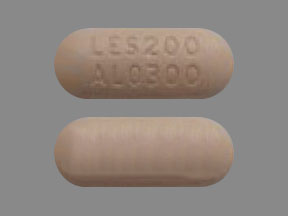Duzallo Disease Interactions
There are 8 disease interactions with Duzallo (allopurinol / lesinurad).
- Secondary hyperuricemia
- Severe renal impairment
- Bone marrow suppression
- Dehydration
- Liver disease
- Renal dysfunction
- CV disease
- Hepatic impairment
Antihyperuricemic agents (applies to Duzallo) secondary hyperuricemia
Major Potential Hazard, Moderate plausibility. Applicable conditions: Tumor Lysis Syndrome, Lesch-Nyhan Syndrome, Organ Transplant
No studies with febuxostat or lesinurad have been conducted in patients with secondary hyperuricemia (including organ transplant recipients). The use of these drugs is contraindicated in patients where the uric acid formation is greatly increased, such as patients with malignant disease, tumor lysis syndrome or Lesch-Nyhan syndrome.
Lesinurad (applies to Duzallo) severe renal impairment
Major Potential Hazard, Moderate plausibility. Applicable conditions: Kidney Transplant, Renal Dysfunction
The use of lesinurad is contraindicated in patients with severe renal impairment, end stage renal disease, kidney transplant recipient and patients on dialysis.
Allopurinol (applies to Duzallo) bone marrow suppression
Moderate Potential Hazard, Moderate plausibility. Applicable conditions: Bone Marrow Depression/Low Blood Counts
Bone marrow suppression has been reported in patients receiving allopurinol; however, most of these patients were receiving concomitant medications with the known potential to cause such an effect. The suppression has occurred from as early as 6 weeks to as long as 6 years after the initiation of allopurinol therapy. Therapy with allopurinol should be administered cautiously to patients with or predisposed to bone marrow suppression.
Allopurinol (applies to Duzallo) dehydration
Moderate Potential Hazard, High plausibility. Applicable conditions: Diarrhea, Vomiting
Patients with pre-existing kidney conditions, including chronic kidney disease or a history of kidney stones, may be at increased risk for worsening of kidney function or acute kidney injury due to xanthine calculi during treatment with this drug. Ensure adequate hydration to maintain a daily urine output of at least 2 liters in adults and 2 liters/m2/day (or 100 mL/m2/hour) in pediatric patients. Maintaining a neutral to slightly alkaline urine pH is also recommended to prevent xanthine calculi and reduce urate precipitation. Renal function should be closely monitored, especially during the early stages of therapy.
Allopurinol (applies to Duzallo) liver disease
Moderate Potential Hazard, Moderate plausibility.
Allopurinol may cause hepatotoxicity. In patients with pre-existing liver disease, monitor liver enzymes periodically during the early stages of therapy. Discontinue treatment in patients with elevated liver enzymes.
Allopurinol (applies to Duzallo) renal dysfunction
Moderate Potential Hazard, High plausibility.
Allopurinol and its primary active metabolite, oxipurinol, are eliminated by the kidneys, and any changes in renal function will likely increase exposure. Additionally, treatment with allopurinol may result in renal impairment due to formation of xanthine calculi or due to precipitation of urates in patients receiving concomitant uricosuric agents. Patients with pre-existing renal disease, may be at increased risk for worsening renal impairment due to xanthine calculi or precipitation of urates while receiving treatment. These patients require lower dosages of allopurinol than normal to control serum urate levels and close monitoring of laboratory parameters of renal function to reassess the patient's dosage. Treatment with allopurinol tablets has not been studied in pediatric patients with severe renal impairment (eGFR less than 20 mL/min) or on dialysis.
Antihyperuricemic agents (applies to Duzallo) CV disease
Moderate Potential Hazard, Moderate plausibility. Applicable conditions: Cardiovascular Disease
Major adverse cardiovascular events (cardiovascular deaths, non- fatal myocardial infarctions and non- fatal strokes), were reported during clinical trials with some antihyperuricemic agents, such as febuxostat and lesinurad. Although a causal relationship has not been established, caution is advised when used in patients with cardiovascular disease. Monitoring for signs or symptoms of myocardial infarction or stroke is recommended.
Febuxostat/lesinurad (applies to Duzallo) hepatic impairment
Moderate Potential Hazard, Moderate plausibility. Applicable conditions: Liver Disease
No studies have been conducted in patients with severe hepatic impairment (Child-Pugh Class C), therefore caution should be exercised if using febuxostat or lesinurad on these patients. No dose adjustment is necessary in patients with mild or moderate hepatic impairment.
Switch to professional interaction data
Duzallo drug interactions
There are 605 drug interactions with Duzallo (allopurinol / lesinurad).
Duzallo alcohol/food interactions
There is 1 alcohol/food interaction with Duzallo (allopurinol / lesinurad).
More about Duzallo (allopurinol / lesinurad)
- Duzallo consumer information
- Check interactions
- Compare alternatives
- Drug images
- Side effects
- Dosage information
- During pregnancy
- FDA approval history
- Drug class: antihyperuricemic agents
Related treatment guides
Drug Interaction Classification
| Highly clinically significant. Avoid combinations; the risk of the interaction outweighs the benefit. | |
| Moderately clinically significant. Usually avoid combinations; use it only under special circumstances. | |
| Minimally clinically significant. Minimize risk; assess risk and consider an alternative drug, take steps to circumvent the interaction risk and/or institute a monitoring plan. | |
| No interaction information available. |
See also:
Further information
Always consult your healthcare provider to ensure the information displayed on this page applies to your personal circumstances.


